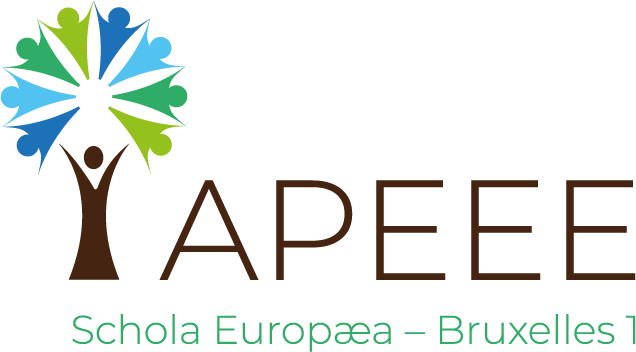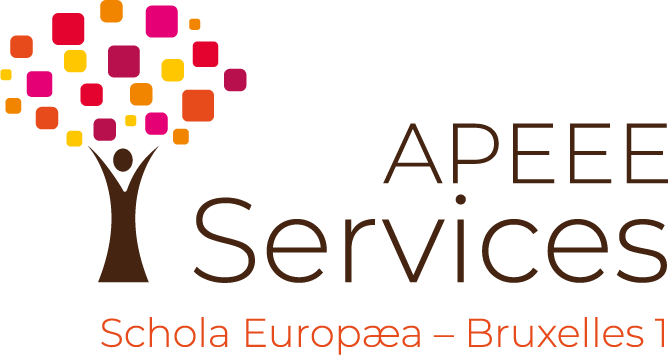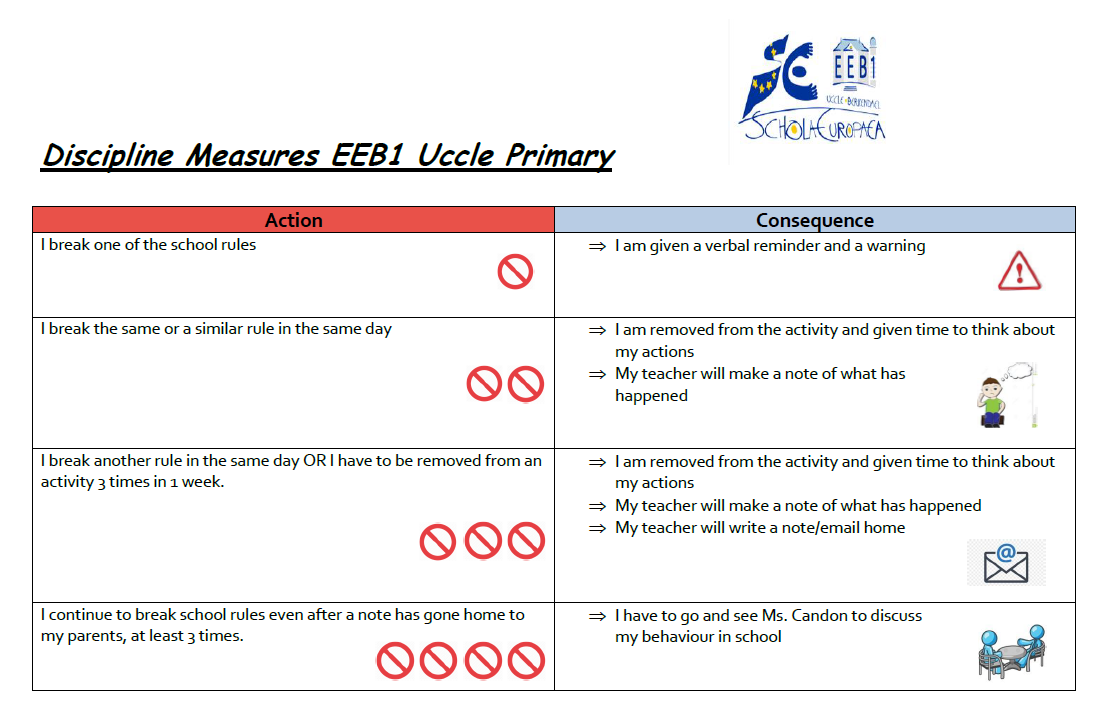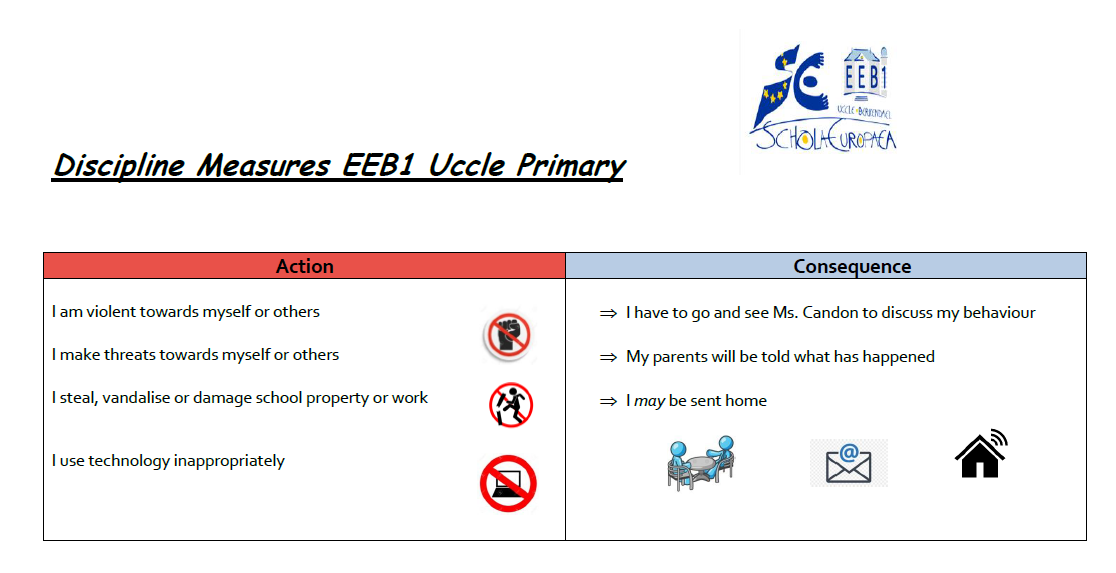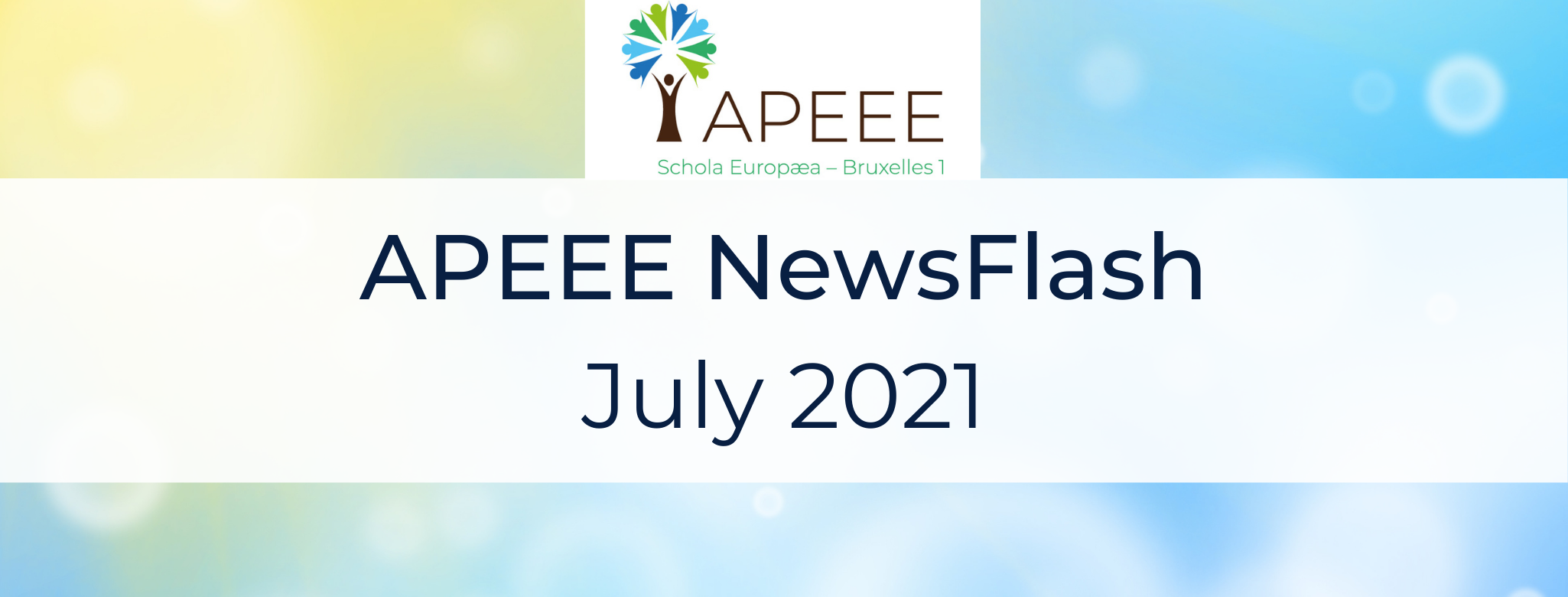
Dear EEBI Parents,
Welcome to the Summer 2021 Edition of the APEEE NewsFlash. In this edition, we open with a close-up on the European Baccalaureate “exam season” and as usual dive into a few more hard-hitting issues; inter alia, the discussion on the end-of-year schedule and 180 Days, developments in our relations with the European institutions, a proposed Resolution on fair working conditions for our locally recruited teachers. We also take a look at some of the work coming out of the Primary and Secondary Education Councils and some activities taking place around campus. Finally, you can learn more about the results of our recent call for projects — from the EEBI Radio project to Internet Safety in Primary...our semi-annual calls have begun to take on a life of their own.
Last year at this time I don’t think we imagined that we could ever feel more exhausted...but somehow I believe this year may really have topped it. I hope all our parents, students and the entire school community have a well-earned rest If this NewsFlash can serve as reading by the poolside or seaside at a mountain resort or at home on your yoga mat...all the better.
We look forward to seeing you soon...but not too soon! 😊
Best regards,
Kathryn Máthé
APEEE President
In Focus: BAC 2021 – The Exam!
The Baccalaureate written exams were taken from 31 May to 11 June this year by over 270 Uccle students. Each student must sit five written exams and in normal years these would be followed by three oral exams; however this year the latter were cancelled as a precaution against COVID-19.
Despite concerns going into this year’s exams, on 29 June we were informed in a letter from the 2021 Chair of the Baccalaureate that there was no need to moderate the final 2021 Baccalaureate marks and that “no difference statistically relevant was observed [in results] in comparison to previous regular EB sessions (2019 and earlier)”. This is a relief to those who feared another downward moderation like last year or a precipitous drop in performance. Still, several of the exams, notably Math-3, Math-5 and Chemistry, took a new approach which seemed to catch many students unprepared; this may have led to lower than expected averages in those subjects.
INTERPARENTS again set up its online Baccalaureate support system, allowing parents and students to submit tickets voicing their concerns on particular exams. Concerns were then collated, researched and presented to the Bac Unit in the central office to take mitigating measures, if/as they deemed appropriate. See INTERPARENTS letter to S7 parents summarising actions taken this year.
The new marking scale with a pass-mark of “5" also came into effect in the Bac this year, so we are waiting to see the eventual impact of this across schools, sections and subjects. We will also be hearing more in the coming weeks and months about the impact on university admission.
Related to this, we have heard the quite surprising and unfortunate news that the Danish government has chosen this late-in-the-day moment to again devalue the Baccalaureate relative to the national results. This change will take effect already for current admissions and has been a source of shock to Danish section families who were already working closely with both the Commission and the Office of the Secretary General (OSGES) to make the equivalence less discriminatory. It is a move in exactly the wrong direction. This will impact not only DA students but others wishing to studying in the otherwise inclusive DA university system. It also sets a worrying precedent.
See also APEEE May 2021 NewsFlash article: New Secondary Marking Scale and University Admissions: Translation of the EB at National Level
In Focus: BAC 2021 – The Fun!
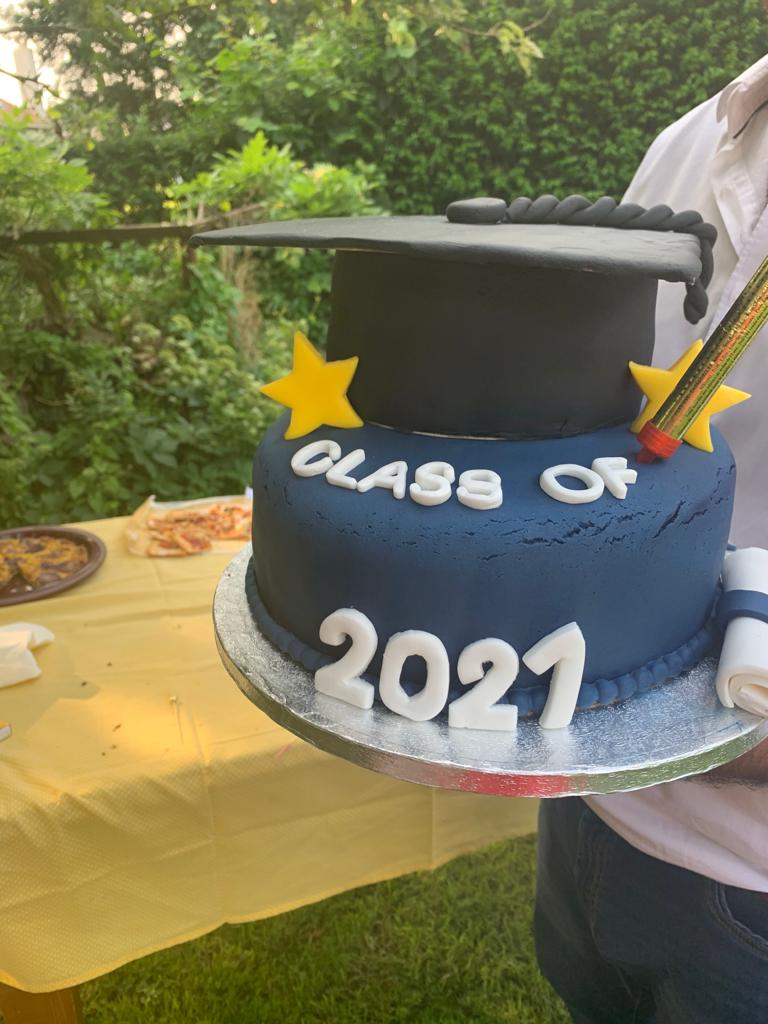
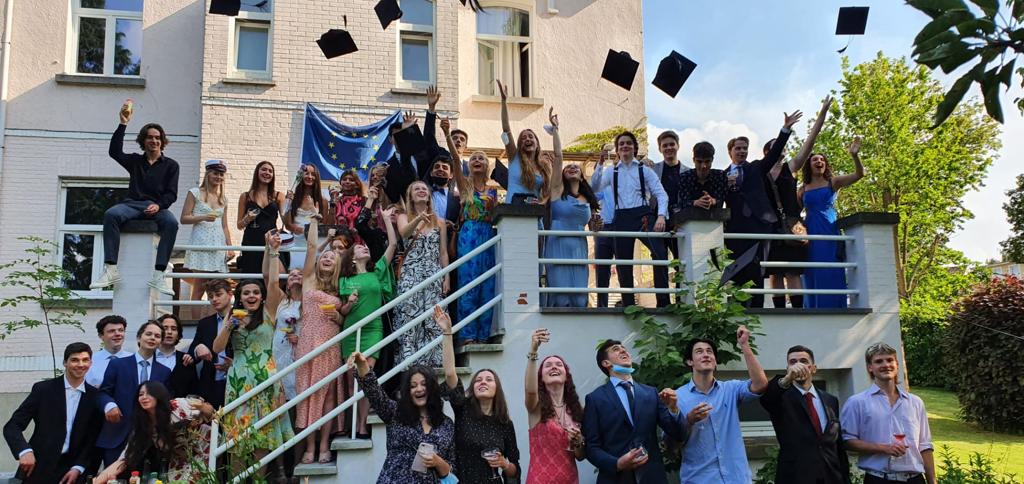
COVID-19 not only impacted the preparation for the Baccalaureate exam, but also took its toll on the usual programme of S7 activities, including the end-of-year Bac Day & BBQ, Bal du Bac and Proclamation Ceremony. For those unfamiliar with this cycle of events, see this helpful YouTube EEBI S7 lipdub from our class of 2013.
On 21 May, EEBI S7 students were compelled to end their school career three days earlier than expected due to fears about COVID-19. This meant that plans for a celebratory final day in school had to be shelved... Our S7 students dug deep and quickly pieced together a post-exam Bac 2021 Pizza Day. In a similar vein, students planned their Bal du Bac on 1 July, the evening before the Proclamation, only to have it cancelled by the commune and venue just the day before. They managed to locate and book a new venue and the event was held on Saturday, 3 July, apparently with great success.
Finally, the Proclamation Ceremony itself was a streamed event held outside of the Château in the Primary yard. S7 parents were deeply disappointed not to attend, but in the end, the event was picturesque in the outdoor setting under the shining sun...and the streaming meant that every family had a great view and extended family and friends could watch as well. There were several garden events held by families in different sections following the Ceremony.
Three cheers for the Class of 2021! They took lemons and made lemonade. This sort of resilience will prove important in their lives to come. We wish all our S7 students and their families a needed rest and a great holiday.
APEEE Membership Fee 2021-2022
Many thanks to all those who have already settled their APEEE Membership Fee for the next school year 2021-2022. Unfortunately, some parents continue to confuse the APEEE with our sister association the APEEE Services. While paid-up membership in the APEEE does remain a condition for accessing the different services (canteen, transport, afterschool activities…) provided by the APEEE Services, we like to think that membership in the APEEE goes far beyond this...
The APEEE is a voluntary organisation in which elected parents work hard on behalf of all families attending the EEBI school (both sites, Uccle and Berkendael). The APEEE Board meets monthly and its Working Groups meet regularly to provide this support and to act as the interface between families and the school in a variety of forums.
The APEEE Membership Fee (50 EUR per family per year) finances the APEEE Secretariat, who provide the back-office support for the APEEE, run our parent communication channels (website, Facebook page) and stand ready to help parents with any question or concern. Being a paid APEEE member means you not only benefit from this general support, but also have access to our members mailing list (e.g. the NewsFlash and other news and announcements) as well as the possibility to take part in APEEE elections – to guide our work more closely.
For those of you who have still not settled your fees, we will be available again after 24 August (the office is now closed for the summer break) for any questions or issues you have with the payment, so please do not hesitate to contact us: info@uccleparents.org. (N.B. – please rest assured that for any reimbursements due for wrong payments, these are detected by the system and the APEEE Secretariat will initiate all reimbursements still due at the rentrée. This will not block you from proceeding with orders for services.)
Issues and Positions: Recent Developments
COVID Update
Since the end of the school year the COVID pandemic has begun to grow again in a majority of EU Member States and is expected to complicate the beginning of the next school year. However there have also been some very positive developments that should help counter this. Here is a brief summary of the most relevant points:
- The spread of the new Delta variant in the EU and the gradual lifting of restrictions will place schools in a vulnerable position in the Autumn, as a large proportion of students will not yet be vaccinated. According to a new report by the European Centre for Communicable Disease Control, preparedness will be essential and measures such as good ventilation, distancing and mask-wearing may have to be used again if necessary to reduce the circulation of the virus.
- A positive development in this regard is that the Belgian High Commissioner for COVID has revealed in a recent interview that he is working on a new ventilation plan for schools to be applied in the new school year 2021-2022. This would go beyond current minimum obligations to open windows regularly and include a requirement for CO2 meters in every classroom and the use of HEPA air filters in those classrooms where acceptable CO2 levels could not be achieved. Although implementation will require negotiation with the regional education ministers, this is very good news and supports the line taken by the APEEE to ask the EEBI management to improve ventilation in order to minimise the risk of COVID contagion through shared air. We will follow this matter closely and report on developments.
- Finally, perhaps the most positive development is that the Belgian government has now approved the vaccination of the general 12-15 age-group with the Pfizer vaccine. This vaccine has been found to be safe and effective by both the EMA in Europe and the CDC in the United States. This is confirmed extensive post-vaccination safety data for this age-group from the US and Israel. It reduces sharply the risk of both severe disease from COVID infection and of long-lasting symptoms (long-COVID) following mild infection.
Beyond the benefits to the individuals and their families, vaccination also has the potential to reduce outbreaks and class and school closures in the autumn, as well as making it possible to control the virus with fewer mitigation measures. If a high coverage is achieved in the EEBI Secondary, it could be a game changer the school year 2021-22, helping reduce the health, human and educational impact of the pandemic.
Brussels plans to send vaccination invitation letters to all 12-15 year olds from 12 July onwards. Wallonia will open up appointments for this group from next week and Flanders plans to open-up appointments from 19 July.
See also: COVID-19 Update
The Commission and The Schools
In the wake of the February presentation to the Parliamentary CULT Committee on 25 May the Brussels APEEE Presidents wrote a letter to Commissioner Hahn asking the European Commission to be more involved in the running of the schools, and in particular in the pedagogical and well-being aspects.
Despite the fact that the Commission is present in key decision-making bodies — i.e. the Board of Governors and its preparatory committees as well as School Admin Boards—, up till now its role has been perceived as primarily financial. The letter specifically urged that DG EAC be brought in to support DG HR on the schools dossier. It also asked the Commission to take a stronger supervisory role, in part by helping to develop better recourse mechanisms, for example an Ombudsperson.
On 1 July, the APEEE Presidents received a response from Commissioner Hahn highlighting the role that the Commission has already played in key issues in recent years, but also expressing interest in exploring further possibilities. In his words, “I certainly agree with you that the Commission should reevaluate its role in the system. Furthermore, we should find in what areas the system might benefit from an increased involvement of the Commission’s services. More contribution from DG EAC is surely an interesting idea.”
The APEEE Presidents have also appreciated the opportunity to meet with members of the European Schools Unit in DG HR over the past weeks to discuss governance.
See also the APEEE’s May 2021 NewsFlash: European School Parents Present to EP’s CULT Committee
2021 End-of-Year Half-Day Schedule: Upshot
On 20 April, the APEEE President sent an open letter to the EEBI Director expressing concerns about the proposed half-days of school planned for end June and early July. This letter was also forwarded by the EEBII APEEE to their Director with the EEBIII APEEE writing a similar letter. As the letter achieved no result, the APEEE Board voted on 12 May to send two follow-up letters on the same issue, one letter to the Secretary General of the European Schools and another letter to the Commission’s Director-General of HR and Security; these were promptly endorsed by the EEBII APEEE.
A response from the Secretary General, Giancarlo Marcheggiano was received on 15 June, explaining the rationale behind the decision to cut the schedule and the extraordinary circumstances which warranted longer class councils. The Secretary General is of the view that the decision lay within the autonomy of the School Directors, given the pandemic situation. On 21 June, we received a response from the Director-General of HR and Security, Gertrud Ingestad, in which she shares the concerns of the APEEEs about the legality of the measures proposed and their impact on parents and students. The issue was likewise raised in a 28 May letter sent from the Chair of the European Parliament CULT Committee, Sabine Verheyen, to the Secretary General in follow up to the February 2021 CULT Committee session on the European Schools. (See the APEEE May 2021 NewsFlash article: European School Parents Present to EP’s CULT Committee.) The letter asks the Secretary General and the Directors of the Brussels-based European Schools to reconsider this decision, “which in the current context sends the wrong message to pupils, parents and the outside world alike.”
While we have not achieved a concrete result on this issue, we nevertheless believe that the willingness of key stakeholders such as the Commission and the European Parliament to become actively involved is an important development. Such active involvement, if sustained, can help us improve educational outcomes and ensure that needed support and governance structures are put in place.
See also APEEE May 2021 NewsFlash article: Brussels European Schools End-of-Year Schedule
See also: Issues and Positions – 180 Working Days for Pupils
Resolution on the Situation of Locally Recruited Teachers
The mission of the European Schools is to provide a multilingual and multicultural education of high quality with a primary importance placed on mother tongue/dominant language. The system rests on the secondment of teachers with Member States sending teachers from their national systems to teach in the European Schools. The ‘Cost Sharing’ agreement determines criteria, targets and timeframe for Member States to second teachers to the European Schools. The objective is to reach the ratio 65 / 35 between seconded and locally recruited teachers. Nevertheless we should not be indifferent to the path we take in reaching this goal.
In fact, over the last years EEBI has experienced an increased turnover of teaching staff and an increase in the number of non-native speaking teachers. Many locally recruited teachers (often native speakers) have been displaced by seconded teachers or are leaving on their own accord due to the lack of security and stability in their jobs. The lack of security is the direct result of the current implementation of the Cost Sharing agreement.
To address these concerns, the APEEE has proposed a Joint Resolution to be approved by all three EEBI Education Councils for presentation to the Board of Governors. EEBI is the biggest school in the system and a joint message of all stakeholders – staff, management, teachers, parents and students – would send a strong signal that the issue is perceived as a problem.
The draft Resolution proposed by parents outlines the main challenges faced by locally recruited teachers – the yearly risk of losing their job or changes in the teaching roster – as well as the framework in which the school operates. It notes in particular that:
- the appointment of a non-native speaker teachers should remain a “pragmatic and exceptional answer to a scarcity situation” according to Control of the level of linguistic competence as part of the procedure for recruitment of non- native speaker teaching and educational support staff;
- there is a disproportionate impact on vehicular language sections and classes (German, English and French). Importantly, the English section has spent recent years building up a strong team of locally-hired teachers which again risks being decimated;
- the European Pillar of Social Rights calls for Secure and adaptable employment (Principle 5) by preventing precarious working conditions and abuse of atypical contracts; as a system attached to the European institutions, we should support the Pillar...it is also the right thing to do.
The draft Resolution was presented and discussed in all three Education Councils in June and July and the intention is to adopt some version of the document in the autumn meetings.
The parents support endeavours to ensure that the European Schools are financially stable and that there is a fair and equitable contribution from Member States. Secondment of teachers to the European Schools is welcomed as it brings stability and predictability and offers teachers a fair and competitive compensation for their work, but it should never be at the expense of quality education and fair working conditions.
See also: APEEE and EEBI
This Month’s Featured Projects
10 Projects Selected Through APEEE Spring 2021 Call for Projects

Twice a year, the APEEE launches a Call for Projects, to help support projects proposed by teachers, parents or students. This year’s Spring 2021 Call had a total purse allocation of 7000 EUR and each project submitted could request up to 1500 EUR maximum. In total, 19 project proposals were submitted for a total of 19,000 EUR. It was a competitive process and the selection proved difficult.
The Award Panel, consisting of representatives from the school, the APEEE Board, the Student Committee and teachers selected 10 projects (including one combined project), based also on the opinions of the relevant APEEE Working Groups and the Financial Advisor.
- Radio EEBI: project aimed at creating a school radio station for the Secondary classes. 1200 EUR allocated.
- Observe, plant and taste in order to respect and share: large-scale gardening project in Berkendael for the Primary classes. 1000 EUR allocated to help cover the cost of gardening material.
- Emotional intelligence and COVID for P4 and P5: workshops organised by the Well-Being Working Group on reinforcement of “Emotional Intelligence” in P4 and P5 in Uccle in relation to the COVID situation. It will consist of an interactive workshop of approx. 25 students each time, with a specialised company on topics including: emotional awareness (being able to identify your own emotions), self-management (manage emotions, for example manage stress), empathy development, motivation. 600 EUR allocated for P4 workshops and 600 EUR allocated for P5 workshops.
- Reinforcement of values for S7: workshops organised by the Well-Being Working Group for S7 students given by an external psychologist, on what is a successful and happy life. 600 EUR allocated.
- Francis Pirotta Creative Arts Prize (4th edition): an annual art competition aimed at Uccle Primary and Nursery classes to celebrate Francis Pirotta's short but creative life and ensure that his spirit and determination remain alive through the creativity of other children. 600 EUR allocated for prizes.
- Package of well being conferences: this recurrent project of the Well-Being Working Group aims at raising awareness among parents and/or pupils from all section and grades about topics of interests related to well-being or mental health, through online conferences. 500 EUR allocated.
- Become a Cyber Hero: promoting safe use of Internet in P4 and P5: project in Berkendael aimed at making kids aware of the risks related to the internet and at promoting appropriate behaviour when online. 400 EUR allocated.
- How parents can support their children in their daily work and learning path: what the cognitive science tells you: conference for parents of 9-14 year old children (open to teachers) by experts in accompanying children with learning troubles (dyslexia, lack of attention, etc) or simply with learning difficulties. The main objective will be to discover how the young brain of our children is developing over years and how it functions as well as the mental gestures associated to learning. 400 EUR allocated.
- Different activities for children during lunchtime breaks: project in Berkendael aimed at diversifying the activities proposed during lunchtime breaks. 300 EUR allocated for the purchase of board games.
The 10 projects proposed came to a total of 6200 EUR. Of the 10 projects, 6 involve Primary classes, 2 involve Secondary classes and 2 involve both.
See also: Projects Funded in 2021-2022
Working Groups in Focus
PedGroup: BYOD Programme
The PedGroup’s Educational Technology group has been working with the school to put in place a robust Bring-Your-Own-Device (BYOD) programme. The programme would aim to have Secondary students bring educational devices to school to support the learning process in different classes — and in particular to facilitate the use of GeoGebra in upper Secondary maths classes. However, the APEEE suggests it is not enough to have students “bring their own devices”, it would be important that:
- the correct technical infrastructure is in place in the school (e.g. strong WiFi network; some recharging stations);
- a broader pedagogical programme is developed whereby devices are used for a variety of activities in different classes and teachers are adequately trained in digital competences; and
- a good legal and policy framework is set up with adequate protection of our children and clear procedures for addressing potential problems.
The APEEE has also highlighted more practical issues: the protection and security of expensive devices, the sheer weight of devices in school bags (especially if textbooks should also be carried), and the upfront investment required of parents with as yet little or no guidance about the actual need. The Student Committee (CdE) has raised similar concerns.
The APEEE is currently meeting with the school and external suppliers to see if we can develop a pilot module in Autumn 2021 focusing on next year’s S5 and S6 students. While the school will not supply devices, we are researching possible service packages which allow the school to work in partnership with parents at some level. We are particularly interested in the rental or rent-to-own arrangement put in place at the Woluwe school. See the Woluwe School’s BYOD Frequently Asked Questions and the Woluwe APEEE’s Understand GeoGebra and BYOD. The available models/functionality, possible keyboard configurations, battery-life of devices, delivery arrangements and insurance coverage would also be important.
GeoGebra will already be required for end of year S6 B Tests next year, so there is a strong need to have a clear programme in place—particularly as the APEEE and the Student Committee (CdE) are also pushing for trials of GeoGebra under exam conditions as early as possible. INTERPARENTS surveyed parents across the system about the roll out of BYOD and GeoGebra, and our EdTech Group has produced a preliminary report on the results for EEBI, which gives us a picture of the current situation at our school.
Parents may also find it helpful to consult the system-level documents produced by the European Schools IT-Pedagogy group and approved in spring of 2020: Guidelines for the pedagogical use of mobile devices in the European Schools and A digital tool for teaching, learning and assessment in Mathematics and Sciences (i.e. GeoGebra).
See also the APEEE’s May 2021 NewsFlash: PedGroup Educational Technology group: From Distance Learning to Digital Learning
See also: Working Groups - Pedagogical Working Group (PedGroup)
PedGroup: Secondary Homework Policy and Distance Learning – Where We Stand Now
The Homework Policy Working Group was set up by the Secondary Education Council in February 2020 at the request of the Student Committee (CdE). Students noted that the amount and timing of homework was not well regulated and that other European Schools (e.g. Munich) already had Homework Policies in place. They suggested that EEBI should develop its own. The Working Group was also mandated to treat the use of the School Management System (SMS). In the December 2020 CE meeting, the topic of Distance Learning was added to the mandate as well. The group was co-chaired by students and parents and included teachers as well.
In May 2021, the HW Policy and Distance Learning Working Group delivered two drafts to the Secondary CE: a draft Homework Policy and a draft TEAMS Guidelines. The proposed Homework Policy is a comprehensive document with basic rules about homework and related practices, based on research into policies in place at other European Schools. The 8-page policy aims “to guide teachers, students and parents on the type, amount and organisation of homework and tests as part of the broader education at EEBI” — allowing homework to serve as a key support without overburdening students.
The proposed TEAMS Guidelines is a living document for the whole school community which, while not prescriptive, aims to harmonise practice among teaching colleagues and students. It contains: an overview of the Microsoft TEAMS Tools available to teachers and students; recommended use of TEAMS tools in different learning scenarios; key links, in particular to Microsoft pages with specific instructions; as well as two annexes with detailed instructions for teachers and students: Managing Assignments and Videoconferencing. A common understanding of practices is also helpful for parents, in particular those with children in lower Secondary cycle.
At the moment, the Homework Policy and Distance Learning Working Group is awaiting additional feedback on the drafts from management and teachers; both groups expressed some concern about the impact of these policies on teachers’ autonomy and their discretion to choose their own work methods. It is hoped that these documents will be approved in some version in autumn, and that they will soon be reflected in school practice.
Other Secondary CE Working Groups still ongoing include: Mobile Phone Policy WG, EEBI Communication Policy WG, Child Protection Policy WG, CE Rule of Procedure WG and Vending Machines WG.
See also: APEEE and EEBI
PedGroup: What Future for Secondary Projects, Trips and Project Weeks at the EEBI?
The APEEE believes that learning undertaken outside a traditional classroom environment can complement the mandatory curriculum and add value to our children’s education. It gives students new perspectives and helps develop the cross-disciplinary competences (Key Competences for Lifelong Learning in the European Schools) while also supporting university admission. At the same time, these activities strengthen the EEBI community, in particular reinforcing the bonds between students and teachers.
For this reason, the APEEE Pedagogical Working Group “Project&Trips in Secondary” undertook to analyse the current offer at EEBI: how such initiatives work, what obstacles they face, how they can be supported, and what scope there is for including these in the Project Weeks or in other formats or arrangements. An initial mapping of activities was carried out between February and May 2021 in consultation with various section representatives and with fruitful input provided through a dozen or so teacher interviews.
We developed a typology of projects that included: 1) European School Programmes, 2) School or European School Brussels Programmes, 3) S6 Trips, 4) Work Experience, 5) Subject Projects/Trips, 6) Competitions run within Member States or at the European Union level, 7) Clubs, 8) and initiatives run under the aegis of Césame (APEEE Services). It was found that virtually all types of the EEBI initiatives suffer from a few common challenges to varying degrees:
- teacher and student awareness of programmes inside and outside of EEBI
- teacher and student motivation to engage in programmes
- scheduling of activities both in the weekly timetable and in the year plan
- management and implementation of initiatives (i.e. the organisational aspects) and funding
- ensuring overall continuity of existing initiatives and creating favourable conditions to start new ones
The APEEE proposes an ad-hoc school Working Group be set up to work on this topic. This group should help define priorities, provide support to grassroots initiatives and exploit external opportunities. It could also help to ensure that students across sections and levels are able to benefit from a wide array of activities and programmes. Finally, it could help to rethink the purpose, format and timing of the Project Week.
After almost two school years of disruption due to the COVID-19 crisis, the APEEE considers it imperative that the school nurture and expand extracurricular activities. In this way, we can ensure that the potential for learning outside the classroom is fully exploited by and in the EEBI Community.
See also: Projects, Trips and Project Weeks
Well-Being: Resources for a Safer Internet
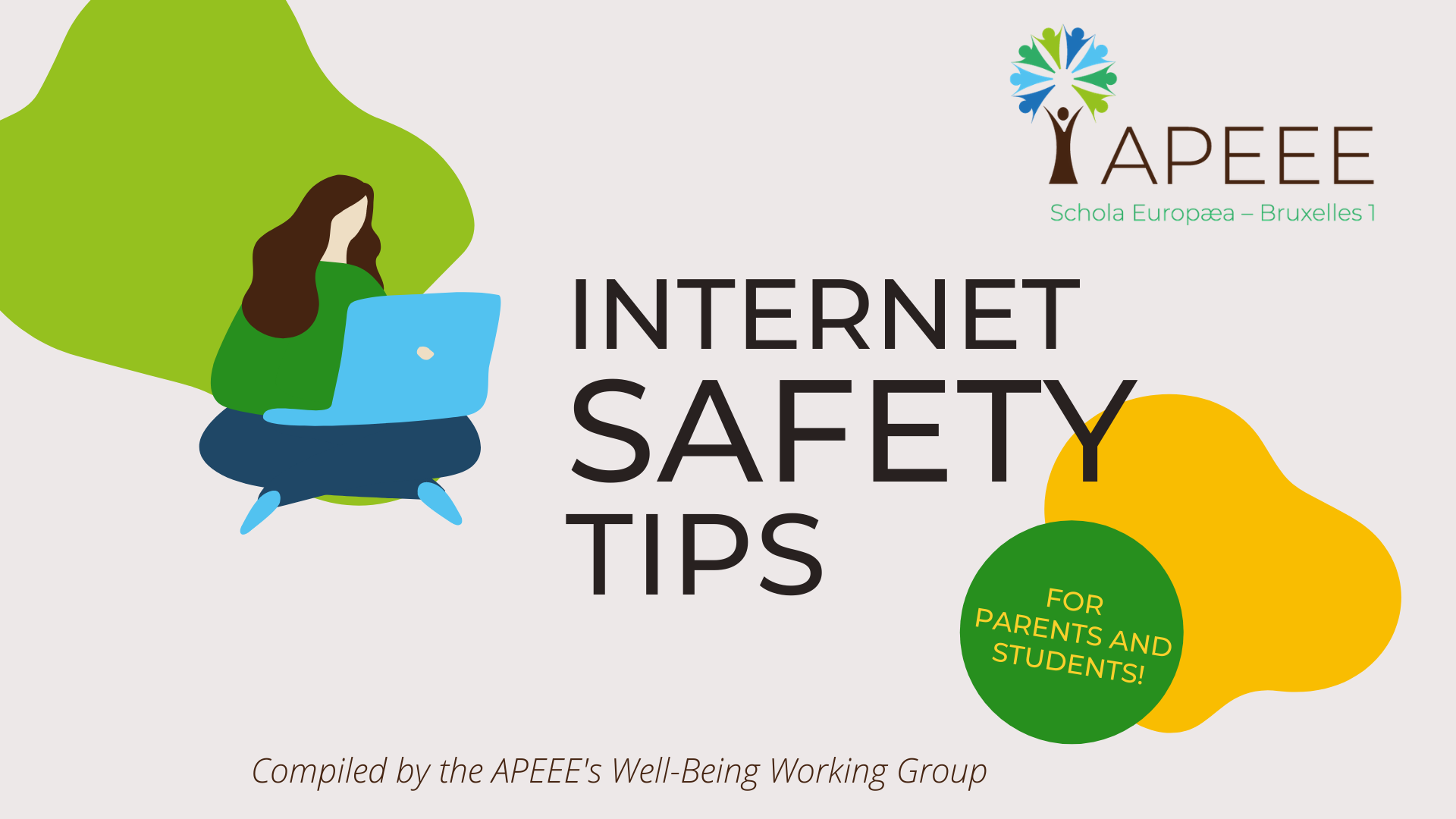
The digital world invaded our daily lives in a brutal way in the spring of 2020, with all its usefulness but also all the risks associated with hyper-connection. Internet, WiFi everywhere, 4G, soon 5G, online courses, social networks, computers, tablets, mobile phones, video games, etc. have largely spilled over into family life and professional and school time over the past year. Cyber-bullying is in the news and pornography has never been so easily accessible even to our (very young) children.
How can we find our way through this digital mass? How can we accompany our youngsters and make the most of the Internet while being aware of the associated dangers?
On 14 June, the APEEE’s Well-Being Group organised a conference for parents and pupils as of P5 to address all these questions. Mr Christophe Butstraen — school mediator in Wallonia and author of "Internet, mes parents, mes profs et moi"— shared his observations, his experience and the tools available to parents and pupils to help them evolve smoothly in the digital world.
The recording of the conference is available as well as the PowerPoint presentation of Mr Butstraen. (not to be shared outside the EEBI circle, please)
See also these useful references collected by the APEEE for a safer use of the Internet, both for parents and pupils.
See also: Well-Being Working Group
Community Building: Picture Gallery
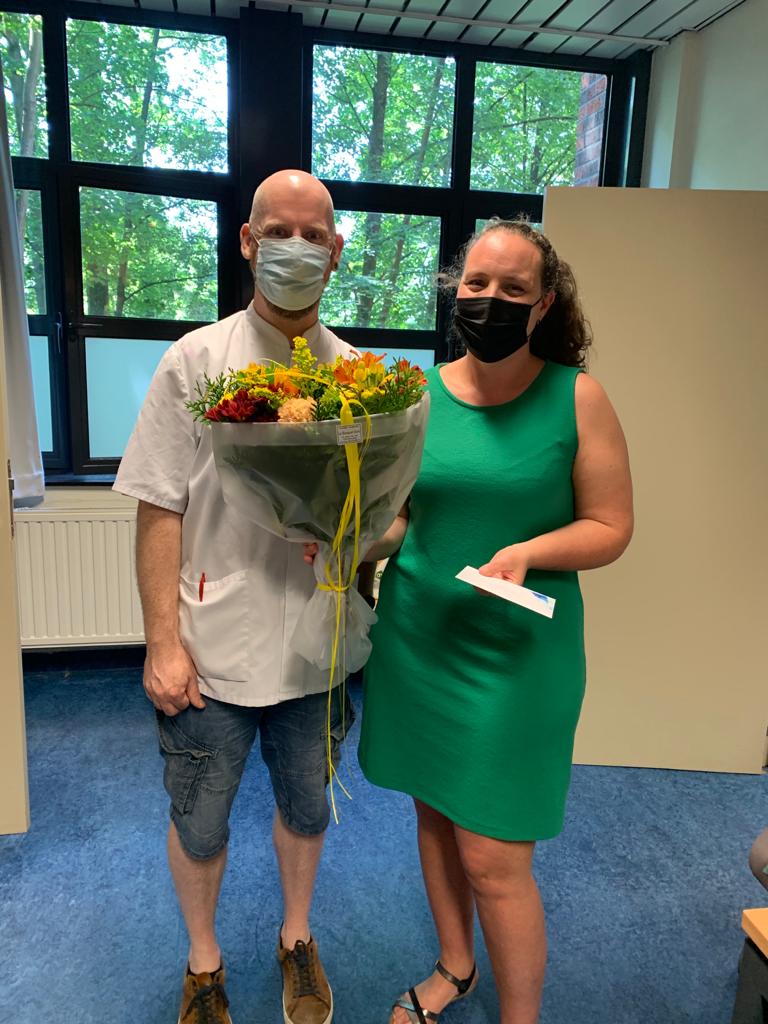
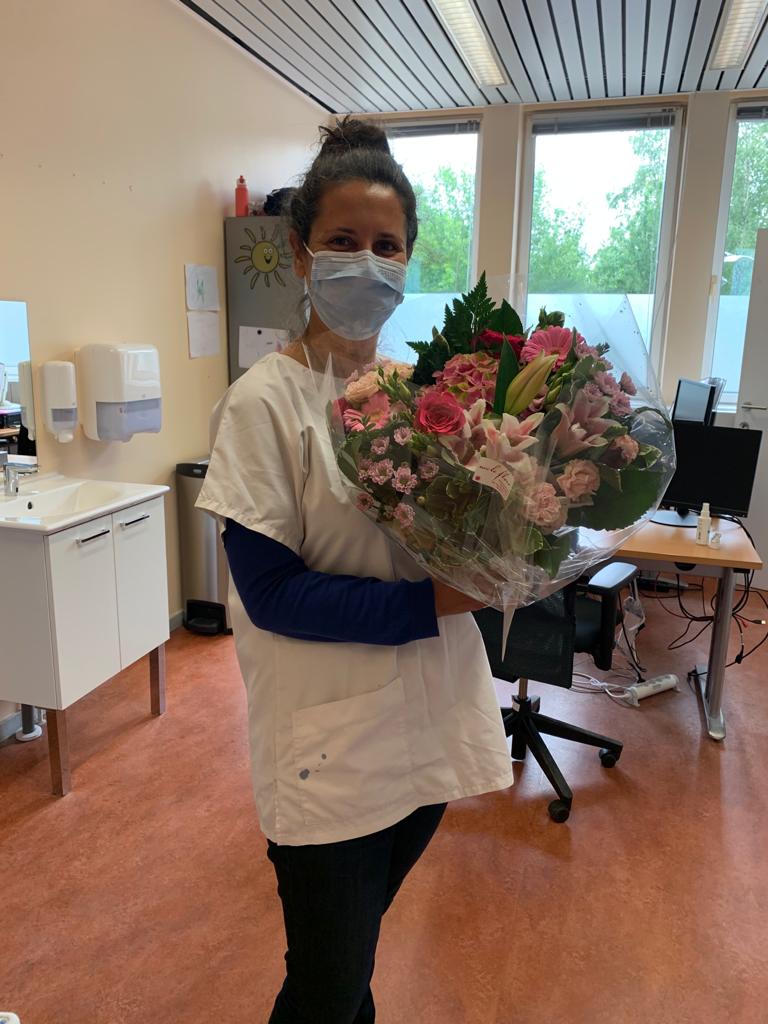
As our community shapes itself around the constraints of the pandemic, our gestures shift towards some different contacts. Like the medical staff of our school who, at the frontline of the surge of COVID cases our school experienced in the last weeks of Spring, had to cope with hundreds of phone calls with confused and distraught parents. These flowers worked to hearten and encourage them. (June 2021)
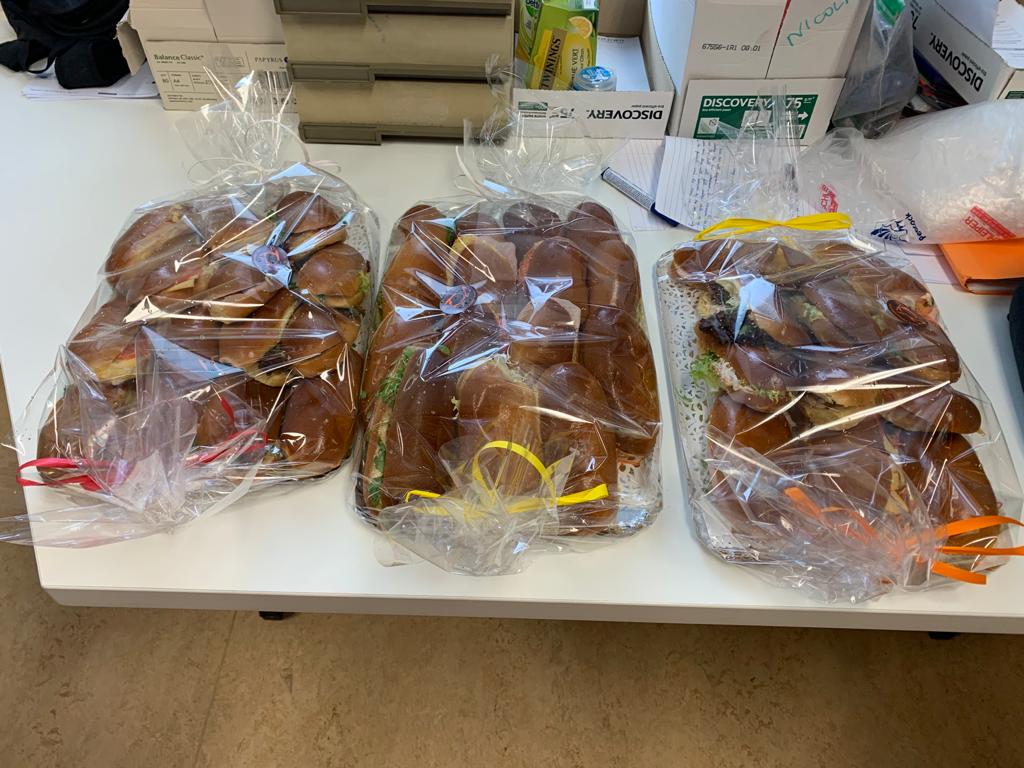
Despite the challenges, some in our school community still have the courage to do a little extra to add value to the school. Like teacher Takis Chrysanthopolous and his L2EN colleagues who, for the first time, organised official Cambridge Assessment exams for nearly a hundred of our students one Saturday in the comfort of their own school. APEEE showed the examiners a warm EEBI welcome, and the teachers our thanks, with these sandwiches. (June 2021)
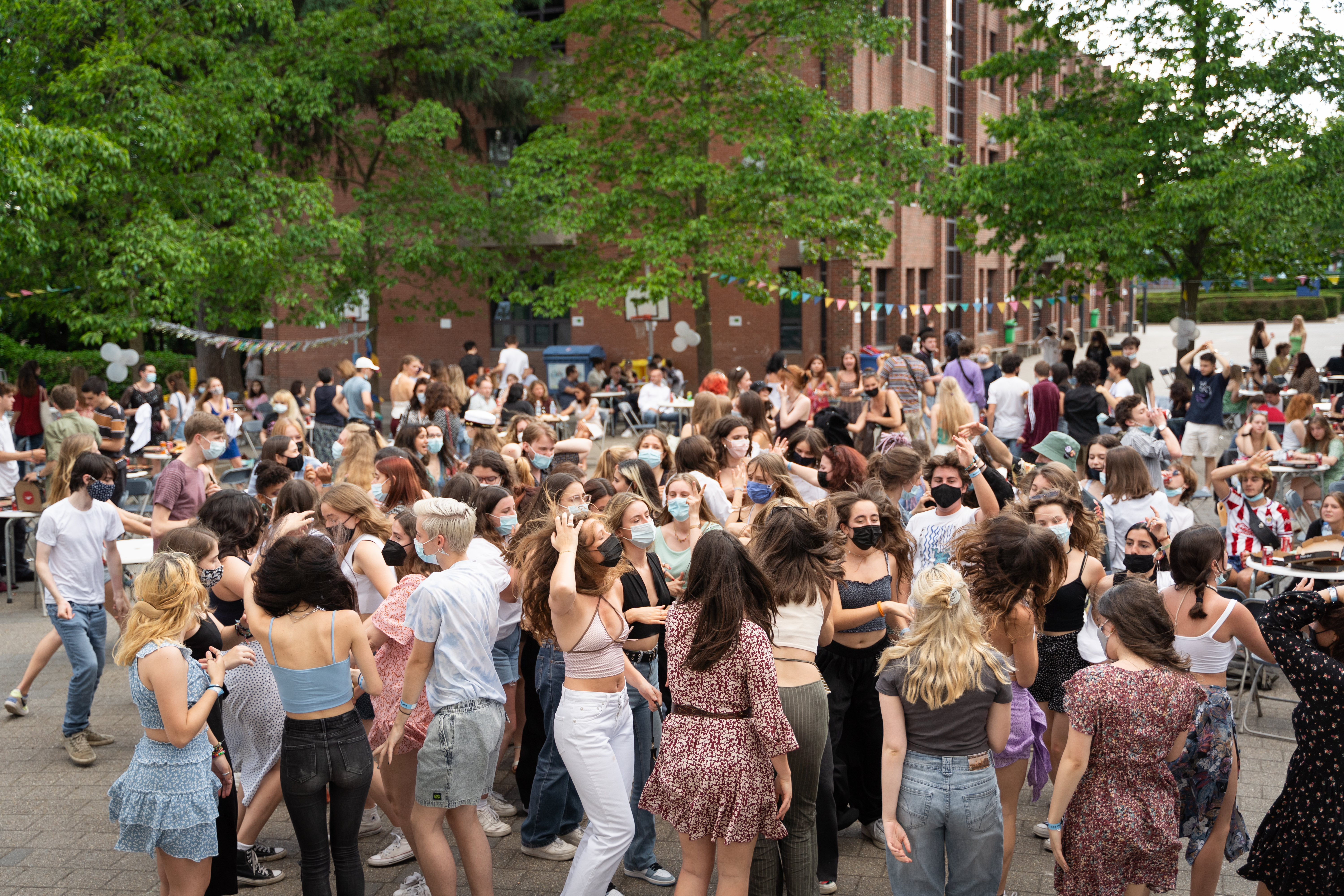
Many of the students in the class of 2021 have been part of the EEBI community for 14 years! What a tough time to crown their achievements with all the usual close-of-year rituals: many of them were rendered impossible by circumstances or policies. The APEEE sent its congratulations and a bit of cheer to our S7s by contributing to their celebratory Pizza Party on 11 June to mark the end of classes and BAC exams.
See also: Community Building Working Group
What’s On in Primary?
Berkendael Ocean Drawing Competition
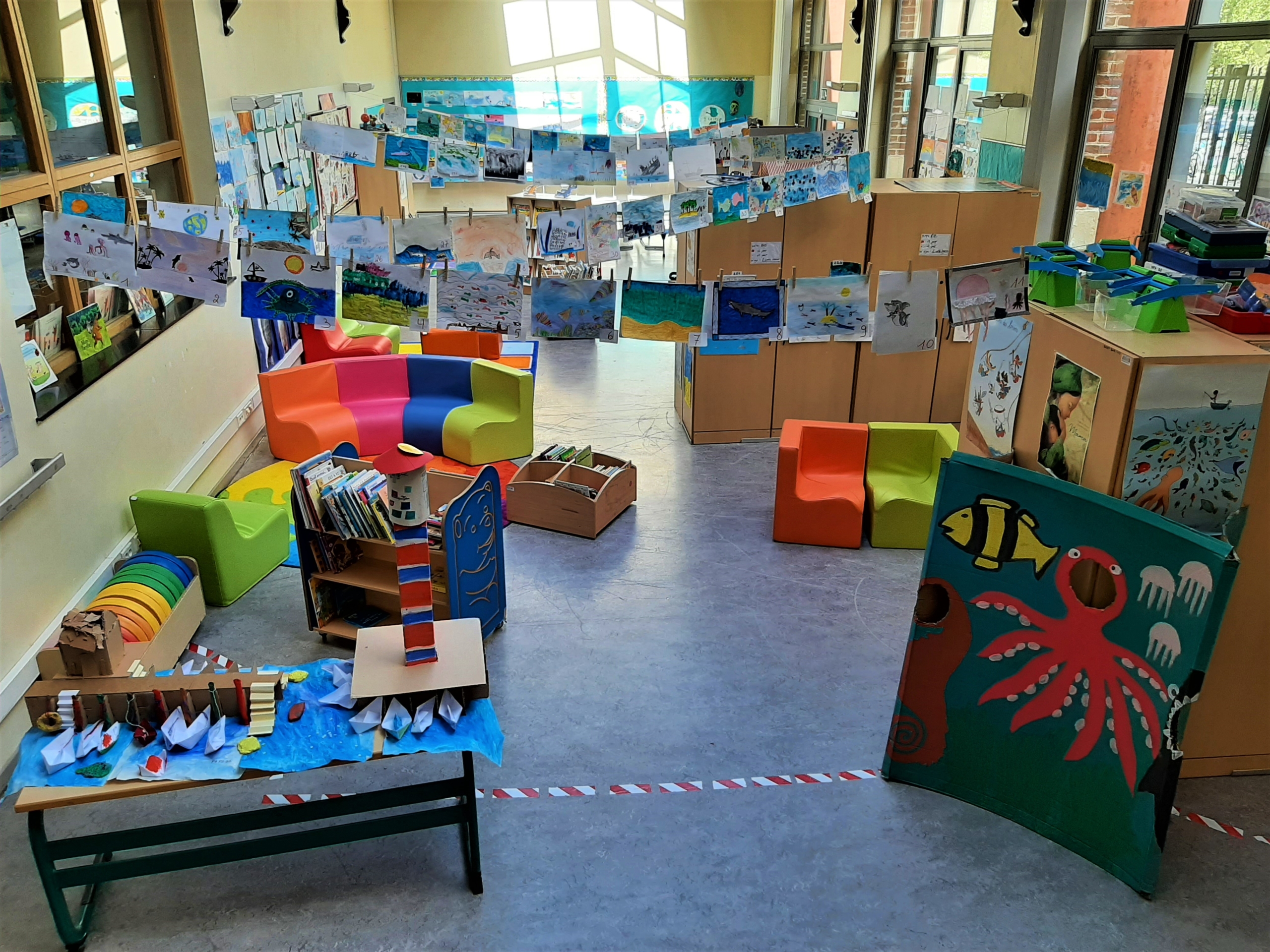
On the occasion of World Ocean Day on 8 June 2021, and to conclude the APEEE-funded project "Citoyens du Monde" — a project on the oceans involving one FR kindergarten class and three P2FR classes at Berkendael — the Frog Room of the school library was decked out in the colours of the sea. These festive occasion was organised by Sylviane, the librarian, in close cooperation with the four teachers involved in the project.
The competition was undertaken under the leadership of Mathieu Girot, kindergarten teacher and coordinator of the larger project; all classes and sections of the Berkendael school were invited to participate in a big competition on the ocean with four categories: 1) realistic drawing of the ocean, 2) imaginary drawing of the ocean, 3) use of various techniques and 4) drawing with a message to protect the ocean. The competition took place over two days and the format was adapted to accommodate the drawings of many children in quarantine due to the health situation. The competition was open to all children and adults in the school community and what a response!
241 drawings were received, numbered and patiently filmed to allow remote voting. The jury was open to the management staff, student delegates and parent delegates of the APEEE. A total of 23 drawings were selected and displayed on the school website. As a matter of interest, several children in quarantine won the competition, which also rewarded grandparents who sent their drawing from the United States. This competition was a perfect conclusion to the superb project on the ocean undertaken over the last two years. It mobilised students, staff and parents on a common, committed, civic and intergenerational project in a context where meetings and collective activities had to be reinvented.
Congratulations to all the winners and a huge thank you to Mathieu Girot, Emilie Cassard, Marie Perters, Sonja Girardin and Sylviane for their investment, time and commitment!
See also: European Blue School
Commemoration of Mrs Rachel Napthine – Rachel Days
13 May marked one year since the untimely death of Rachel Napthine – an excellent and kind EN section Nursery teacher who was very close to so many of her students. At the Primary various activities were organised to cherish her memory, in particular in the EN department. The three main activities were the following:
Rachel’s Reading Corner – This corner was dedicated to the memory of Rachel Napthine. The Art Coordinators contributed to the making of it, depicting a tree. The leaves of the tree were made out of the children’s handprints, former students of Rachel and current students of Ms Erin Mitchell. Rachel’s Reading Corner was organised and designed by Ms Mitchell, P2EN Class teacher. Big thanks also to parents Andreja Bajt and Helena Kurnik who helped Ms Mitchell.
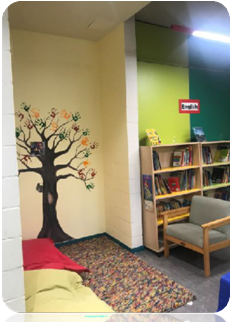
You are My Sunshine project – This was a Primary campus-wide project where all the walls of the corridors in each building of the Primary were covered with shining suns and sunflowers. The project was inspired by the song “You are my Sunshine” that Rachel used to sing with her pupils. The singing of the EN Section students was recorded and sent to her family and those who were close to her to show them that her memorylives on in the atmosphere of our school.
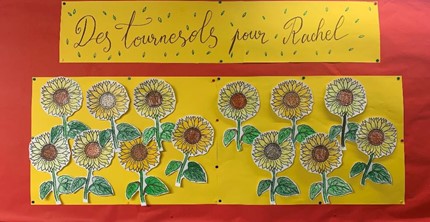
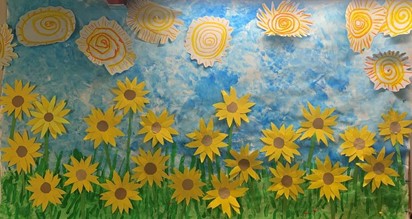
This year’s Francis Pirotta Creative Arts Prize (the 3rd edition) was also dedicated to the memory of Rachel Napthine, who taught Francis in the Nursery and nourished his love of stories. Francis himself had an interest in stories, poems and comics. Students were asked to design a cover for a book, a short story or a poem that they read in their class.
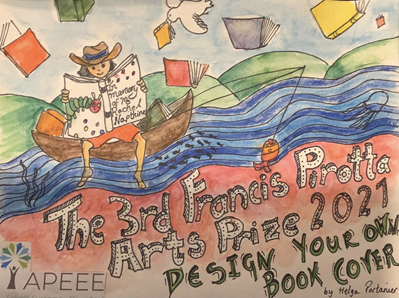
Rachel’s death was a tragedy for our entire school but we can draw some comfort from knowing how much she would have appreciated our community coming together to realise all these projects.
Change in Disciplinary Measures in Uccle Primary
Next year will see changes in the disciplinary approach in Uccle Primary. The changes were needed due to an increase in incidents of rules not being obeyed. Cases came from all language sections and all levels from P1 to P5.
During the school year, systematic recording has allowed the teacher responsible to know the frequent perpetrators and to work with them to help them improve. It became clear for instance that most of the incidents happened later in the week (Thursday or Friday) and usually before holidays breaks. This showed that children were tired at those times and they controlled their emotions less. Of course the COVID situation had its impact too, no doubt.
The latest Uccle Primary Educational Council was informed that the Direction have surveyed the teachers and consulted parent representatives on the recommended changes. The response from the teachers was generally positive with some additions requested: more images in the agenda for P1, P2 and P3 and better communication with pupils regarding sanctions when rules are not respected.
There were also some key areas highlighted by the parents which will also be addressed before the agenda comes into use from the next school year, in particular clearer and stronger links to be made with the KiVa programme; better definition of the inappropriate use of technology; and a need for positive behaviour to be promoted and rewarded.
See the Actions and Consequences table here below:
The APEEE highly recommends that these rules be discussed at home so that families play their part in ensuring that the rules are fully understood by their children..
The new rules were prepared through collaboration and team work with all stakeholders, and besides parents included the CARE team, the KiVa team, the school psychologists, the Data Protection Officer and the IT coordinators.
What’s On in Secondary?
The Rainbow Group: Gender Neutral Toilets in the Platon Building
Discovering the aspects of their own identity can be a challenge for adolescents, and our school is lucky to have members of our community ready to provide support. After years of more informal Valentine’s Day LGBTQA+ bakesales and a thematic film-poster exhibition at the 60 Year Anniversary Fete, EEBI’s official Rainbow Group was set up in September 2019 as a safe space for all students to discuss issues of sexuality and gender. It meets for 45 minutes every week in term time and offers an inclusive space where any student is welcome.
Although initially there were some concerns about how the Rainbow Group would be received, the reaction from students, parents, teachers, and the school administration has been very positive. The Group has visited the European Parliament and met with an MEP, it has biweekly presentations by students on subjects ranging from gender and sexuality in literature to what it means to be asexual. It has held virtual sessions with the Irish LGBT charity Shout Out –– one of whose workers is a former student of EEBI and therefore understands the nature of the European Schools. Beyond these concrete actions, it is widely felt that the presence of the Rainbow Group has fostered better understanding overall about gender diversity.
Students who identify as LGBTQA+ have advocated for gender-neutral toilets in the school. It became apparent at the Rainbow Group meetings that some students were avoiding using the toilets for the entire day because they felt there was nowhere for them to go. Secondary school teacher Brendan Costello, who along with original creator of the Rainbow Group Jeroen Masson, has been moderating the group, engaged with school management to investigate whether it would be possible to assign gender neutral toilets. “The School Management couldn’t have been more helpful,” said Mr Costello, “the Director Mr Goggins and the Deputy Director Ms Künster were fully behind the initiative.”
The school designated two toilets in the Platon building as gender neutral WCs. Mr Costello wanted to point out that designating two toilets as gender neutral doesn’t mean a reduction in the number of facilities for everyone else. The two gender-neutral toilets, one located next to the S1/S3 canteen and the other in the corridor leading up to the S1/S3 library, were previously reserved for users with a disability, but were locked. Now that they’ve been redesignated, they’re open to everyone to use.
Although this was Mr Masson’s last year at EEBI, the Rainbow Group will continue next year and Mr Costello will be joined by fellow teacher Sidney Ayers. If you want to ask any questions about the Rainbow Group, please contact one of the teachers: Brendan Costello (brendan.costello@teacher.eursc.eu) or Sidney Ayers (ayerssi@teacher.eursc.eu).
Interactive Online Second-Hand Booksales for Secondary
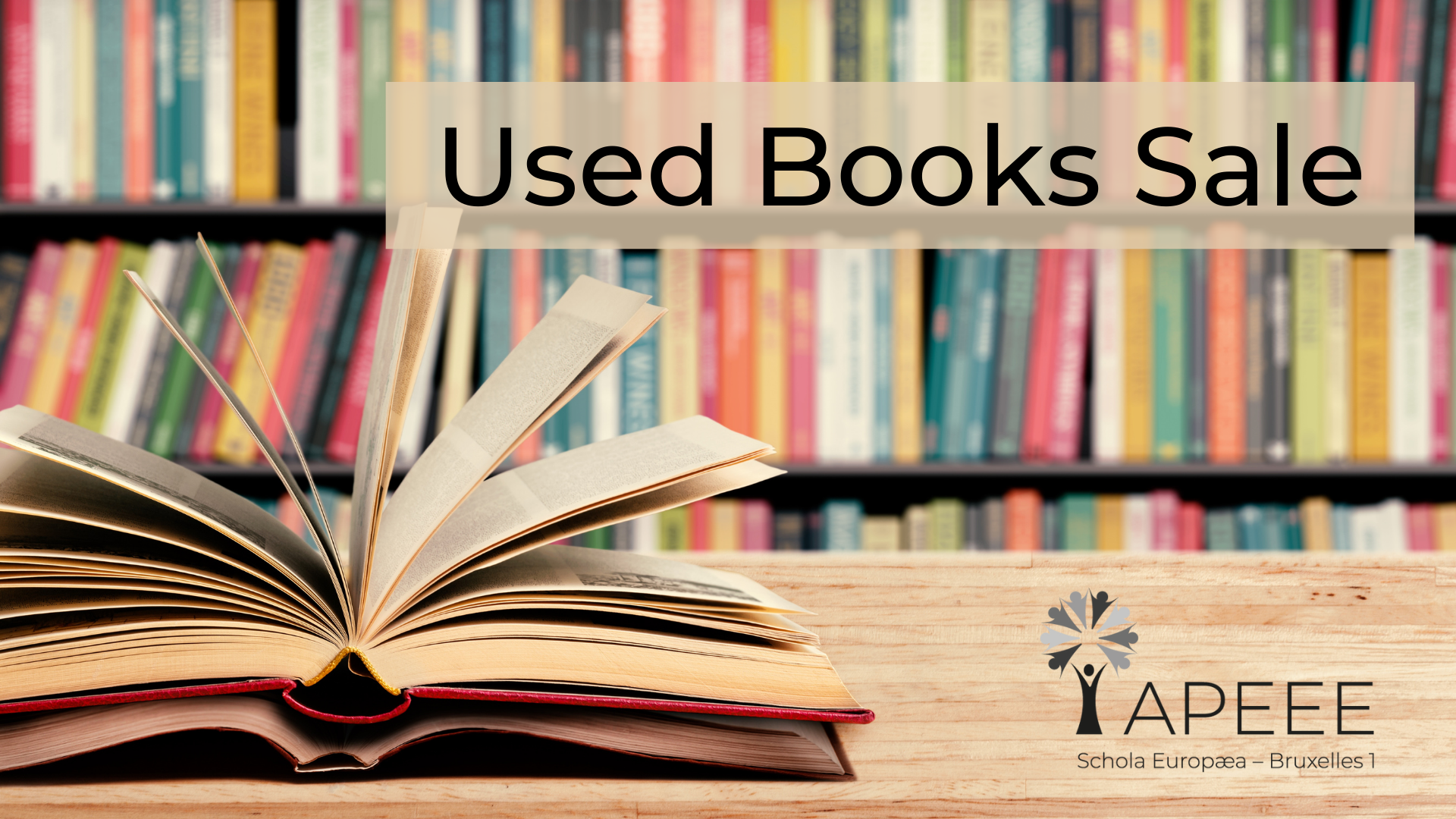
Second-hand textbook sales have seen over a decade of tradition at our school, with pioneers from the EN section soon joined by the FR and IT sections, while the ES have favoured a free book exchange approach. Like so many things, the need for social distancing under the COVID pandemic put a halt to an activity that usually depends on volunteer parents setting up tables outside the 123 Caf and chit-chatting with students, teachers and other parents for a few days in June and September.
But our schoolbooks are special, hard to find, and abundantly available from those families moving up through the cycles. And our parents are committed to good value and recycling! So this year, second-hand textbooks and reading books for Secondary levels were sold and bought in the EN, FR, ES and IT sections by means of an interactive Google document communicated through the APEEE.
Parents and students who were interested in selling second-hand textbooks and reading books filled out a list with the details of the books to be sold, enabling parents and students interested in buying the books to contact the seller directly. They arranged payment and details of handover of the books with each other directly. Some sections also included reading books that were not set books on the curriculum. Of course most of the sections are also exchanging L2 books, which are useful for all EEBI Primary students.
Do you have textbooks that are no longer needed but are still on the 21-22 booklist? Or maybe you are looking for an out-of-print book required by your teacher, or have had enough of supporting Amazon this year? Check out the dedicated booksale webpages created for each section:
The online lists will remain open over the summer for the use of parents and volunteers will be available again at the beginning of September to help manage any issues that arise.
If you would be interested in volunteering to work on one of the existing teams or you would like to organise a stand for your section, please contact the APEEE Secretariat: info@uccleparents.org.
See also: Volunteer-Run Services - Used Textbook Sale
Cambridge Language Certificate at EEBI
Up until now, EEBI Secondary students who wished to validate their English language skills by taking the Cambridge Assessment English language exam, would have to make their way to the British Council’s testing centre. The Cambridge Exam, a leading qualification for English Language Learning, was already offered at some of the other European and international schools in Brussels but never at EEBI. But thanks to the efforts of our L2EN teaching staff, this changed on a spring Saturday, when 78 candidates and a team of examiners arrived at the new exam site on the Uccle campus. As we all know, exam taking can be stressful, so having the opportunity to take this exam in the familiar environment of the school was doubtless helpful in reducing the stress. Perhaps this contributed to the excellent results scored by our students!
At this session, the exam was open to S6 and S7 students only, with seventy-eight candidates being entered in the exam. Twenty-two candidates obtained an average score of 200-210 points, which means they were awarded the highest category of C2. Special congratulations are due to three students who achieved 210/210 points in four out of five parts of the test. Fifty-two candidates obtained an average score of 180-199, which translated into C1+ level, and four candidates achieved B2 level.
Credit for the initiative and hearty thanks are due to Mr Panagiotis “Takis” Chrysanthopoulos and Mr Martin O’Sullivan for taking up the challenge of organising the exam, and for their commitment to ensuring the smooth and successful running of the exam on the day. The Secondary Deputy Director, Ms Künster, deserves our thanks as well for giving her full support to the initiative. The APEEE expressed our support and gratitude by providing refreshments for exam supervisors. Supervisors were delighted with the warm reception at EEBI.
The event was very much welcomed by parents and students alike. Despite the short notice there was a large number of entrants for this on-site exam, which clearly shows there is strong demand among EEBI students for this additional qualification. The APEEE very much hopes that this exam will become an annual event in the EEBI calendar and that similar arrangements will be considered for other languages where there is demand.
You May Be Interested In…
Road Safety, Transport and Mobility at Berkendael and Uccle
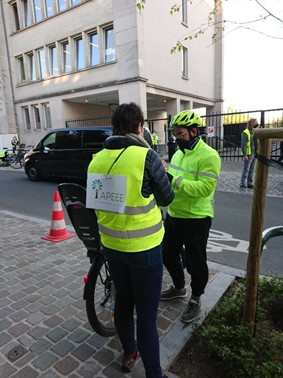
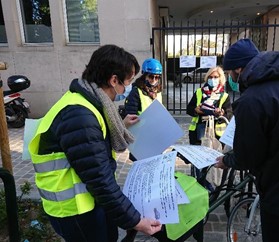
The school management has been working with the Forest and Uccle Communes and police on short- and long-term mobility solutions, particularly to ensure safety in front of the Berkendael site — where the mixture of car, foot and bicycle traffic has become a real safety concern. The consultancy agency VIAS was contacted to produce a Mobility Audit, which took place at both sites on 17 May. The final Report of the Mobility Audit will be available in the Autumn 2021.
The week of 26 April, the APEEE Berkendael also ran an awareness campaign on issues of road safety and mobility around the Berkendael school, which was run by helpful volunteer parents who distributed Road Safety fliers and encouraged families to think carefully about their modes of transport.
Finally, the APEEE Services released a report on the results of their survey gauging EEBI parent opinion on their plans to phase in zero-emission buses. Parents voted overwhelmingly in favour but also raised interesting questions, which are addressed in the report.
Slovenian Cultural Events
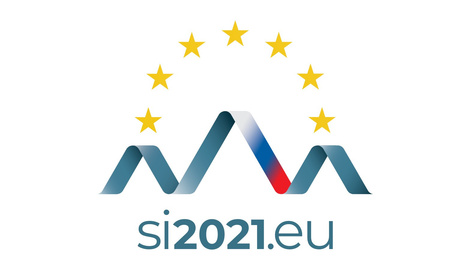
Slovenian SWALS parents would like to invite EEBI families to celebrate with them at various cultural events organised live and on-line in Brussels and in Luxembourg until the end of 2021, with several art exhibitions and literary events taking place already in July. EEBI is the only Brussels European School with Slovenian SWALS (“Students Without A Language Section”). Currently around a 120-member-strong and vibrant community, the EEBI Slovenian student community is spread across our Anglophone, Francophone or German-speaking sections. The cultural events are organised in the context of the Slovenian presidency of the Council of the European Union in the second half of 2021.
The Bridge Academy Summer Theatre Workshop

The Bridge Academy Summer Theatre Workshop will take place on 23-27 August 2021 at the Pianofabriek in St Gilles. It is open for 10-18 year olds. For inspiration this year they are taking the hit film, THE GREATEST SHOWMAN, and their theme of inclusion.
The programme foresees five amazing days of performing arts tuition by a team of friendly theatre creatives who are coming over from the UK especially for the workshop. Participants will have coaching in acting, singing and dancing that will culminate in a presentation to parents and friends on the final day, based on The Greatest Showman. There will also be special master classes in puppetry by a former cast member of Avenue Q and in stage combat.
Groups will be divided by age with a maximum of 20 per group. This will give participants the opportunity to make new friends and to build confidence in each of the disciplines, as well as English.
The price for the five full days is 279 EUR, which works out at just under 7 EUR per hour. Places are limited and are offered on a first come, first served basis. Registration and information.
